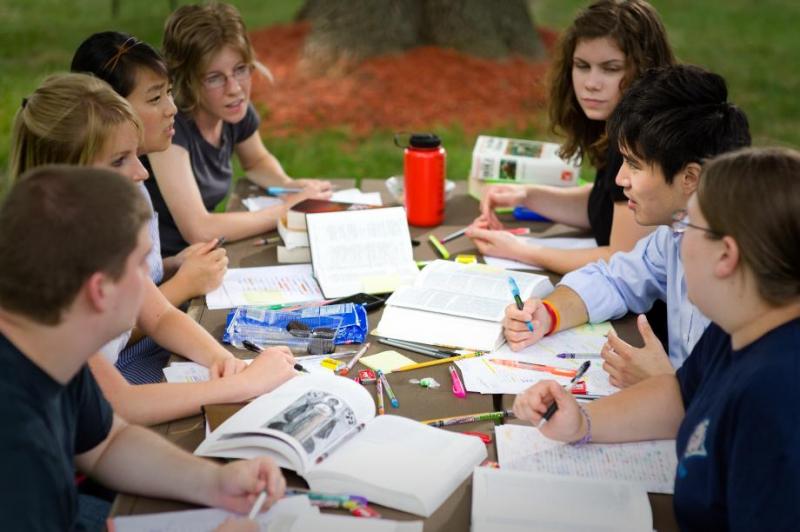The best Bible study I’ve ever witnessed in my chapter was led by a non-Christian. “Jean” (not her real name) was an international graduate student from China, and came to our weekly international dinner and fellowship night at the invitation of a friend in her department. “I respect Christians because they helped me a lot when I got here, but I don’t believe in God,” Jean said that night.
We soon invited Jean and several other non-Christian internationals to study the gospel of John with us. One of the great privileges of serving in GFM has been learning inductive manuscript study from some of InterVarsity’s best Bible expositors. I was eager to use this method in our study.
We followed the classic inductive Bible study method – observation, interpretation, and application. It was challenging, at first, mostly for the Christians in the room who wanted to “preach” to their non-Christian friends. But we also saw the benefits pretty quickly. The observation stage got us all on the same page. No matter their comfort-level with English, Jean and the other internationals could identify repeated words. The interpretation stage enabled our international friends to ask hard questions. The application stage prompted the Christians in the room to make consistent invitations to their non-Christian friends to put their faith in Jesus.
We finished the gospel of John by the end of the school year, and needed to decide what to do next. Jean was definitely a seeker at this point, but resisted giving her life fully over to Jesus. However, we also noticed that Jean knew the steps of inductive Bible study well. That inspired one student leader, who suggested, “Let’s do a series of Bible studies on our favorite stories of Jesus. We’ll take turns leading, and can invite our non-Christian friends to each lead one of the studies. That way, they have to figure out their favorite story of Jesus!”
It felt like a risky move. Would our non-Christian friends even be comfortable and willing to lead a Bible study? What if they didn’t do a good job? Or worse, what if they led the group away from orthodoxy? Even so, it felt like the Holy Spirit’s leading, so we went with it.
Jean was the first non-Christian international to lead a Bible study. She was hesitant at first and felt unqualified. I assured her, “You can do this. Leading a good Bible study isn’t about knowing all the answers, it’s about asking the right questions.”
I met with Jean before the study to go over her plan and make sure she was prepared and on the right track. “So, what story of Jesus did you pick as your favorite?” I asked.
“Acts chapter 2,” Jean replied.
I was a little confused and said nothing right away, so Jean continued, “I know it’s not really a story of Jesus. But since we finished John, I decided to keep going. I started reading Acts, and Acts 2 seems really important.” “You’re right!” I replied. “It is a very important story.”
 So, Jean led a Bible study on the story of Pentecost. She was the best inductive Bible study leader in the group. With every question Jean posed to the group during interpretation, the Christians responded with ‘preachy’ answers that they had heard in sermons and read in books. Jean kept replying, “No! Where in the text is the answer to my question?”
So, Jean led a Bible study on the story of Pentecost. She was the best inductive Bible study leader in the group. With every question Jean posed to the group during interpretation, the Christians responded with ‘preachy’ answers that they had heard in sermons and read in books. Jean kept replying, “No! Where in the text is the answer to my question?”
At one point, Jean said, “When Peter preaches to the people, he quotes the prophet Joel, who says, ‘Everyone who calls upon the name of the Lord will be saved.’ Why do we need to be saved?”
That really got the Christians going! Each Christian in the room began sharing their favorite gospel model. I’d never seen so many crosses filling chasms in one room. Jean, of course, held them all accountable for not turning to the Scripture text for their answers. Eventually she gave up on the group and answered her own question. “When Peter refers to Jesus in this sermon,” she explained, “Peter says, ‘Jesus, whom you crucified.’ I’m pretty sure the people listening to Peter’s sermon weren’t the ones who actually hammered the nails into Jesus’ hands. But somehow, they all were responsible for his crucifixion too. And I think we’re somehow responsible too. And we need to be forgiven for that.”
I was floored. Jean understood the gospel. And she was figuring it out for herself. All we did was teach her how to read the Bible well. It took many more conversations and much more prayer, but eventually, this past August, Jean gave her life to Christ.
Multiple times, I’ve heard people outside of our movement call inductive Bible study “InterVarsity’s gift to the Church.” I think that’s true. But as I’ve led internationals in Bible study, I’ve also come to see it as our gift to the whole world. Teaching the international students and faculty connected to our fellowships to read and study Scripture well is one of the best gifts we can give them. In giving this gift, we will equip the future leaders of the world to be faithful followers of Jesus. And they just might become the best Bible study leaders in your chapter.